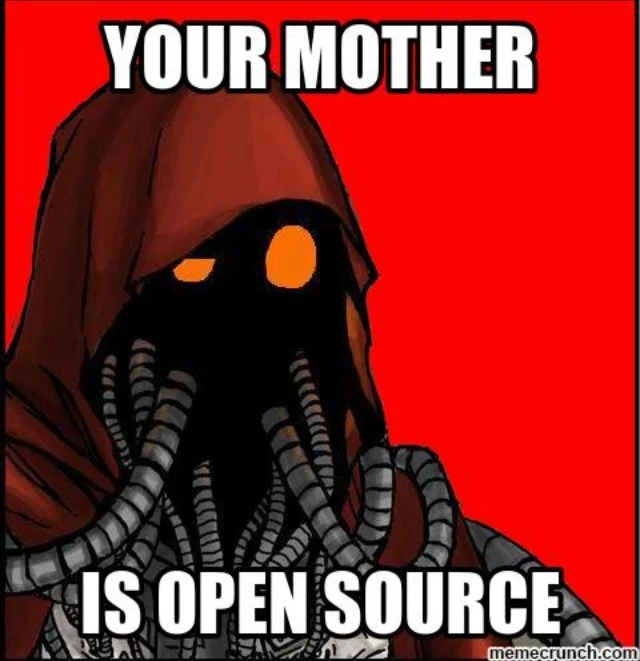And no, I’m not talking about pirating on the internet, I’m talking about getting your internet connection to the outside world without paying or having a subscription or license. Something like a mesh network with your neighbors with the exit node being one person’s high-speed fiber line, or even an exit node through a free public wifi network that you’ve hidden a little repeater device within range of… something like that could be interesting. I’ve been thinking lately of a world where decentralized networks become more common, and where people can freely use the internet without paying an ISP. What are your thoughts?
Back in the WEP/WPS days it was easy enough to use aircrack-ng and get access to a network. Anything public is likely to be slow and probably no access to open ports or manage it in any way.
I’m paying ~$45 CAD/month for a symmetrical 500Mbps line and I think its worth it. I’d never share this with anyone I don’t know because my name is on it, anything anyone does will come back to me.
I’d never share this with anyone I don’t know because my name is on it, anything anyone does will come back to me.
I’m the opposite. I keep no password on my wifi so I have plausible deniability
Just as s comment for someone else reading this: if this actually has a chance to protect you is highly dependant on your local laws. Even then, at least from my understanding, any lawsuit has to progress relatively far (involving lawyers to a significant degree) for this to become potentially relevant.
It would probably be safer legally to have a long range wifi and let users sign up for free, after agreeing to obey the laws. And then some kind of no-log or worthless-log policy.
Here that doesn’t change or help in any way. You’re the one on the contract for the Internet access, so you’re responsible. That’s it.
You can operate as an ISP, but the requirements and responsibilities that go with that make this a non-starter. From my (limited) understanding, it includes that if you can’t provide the identity of someone who is being sued (including piracy, but also any other law breaking), you’re responsible.
If you do that then you’re probably violating your ISPs TOS and they’d can you anyways, and if they really don’t like you sue for it.
Yeah, I used aircrack to gain access to one of my neighbors wifi and used it for about a month when I moved into my first apartment. After I got my own connection, I set up a guest network/SSID that was open,
deleted by creator
Many many years ago in the paleolithic era when 2.4GHz was king, a neighbor in the next unit over had an unsecured wifi network… I connected my old laptop, figured out where the connection was best (turned out to be beside the stove in the kitchen?), piped the connection out the ethernet port and into the WAN port on my router, and set up my own “secured” network lol. I’m fairly certain anyone with a straight-up unsecured wifi network doesn’t have the skills or knowledge to detect someone leaching their bandwidth. I did that for like 3 years without a single hiccup until I moved and finally had to start paying.
Ah, yes, the WEP key passphrase era. I was a student then, and you could find me on the roof trying to get a stable signal to inject and capture data packets. Otherwise, no internet for me.
Or he believes in sharing his internet like the Freifunk People do.
Not everyone who is sharing something for free with you is a moron you’re taking advantage of. Pretty disgusting worldview
They said “pretty sure”, not certain. Statistically, they were right, until routers started shipping with “secured” wifi settings by default. Nowadays, its the reverse.
It wasn’t super relevant to the story, but yeah, I could just browse the files right on their PC, definitely a “Not intending to share it for free” kind of situation, completely devoid of any authentication or security.
About 10 years ago, I just moved and my new neighbor had an open network. Problem was they were 2 houses away and across the street. I set up a tiny repeater in my car with a battery pack and parked half way between us.
It worked surprising well for about 6 months.
Haha, awesome.
Hell, you could pickup a used car battery and have power for a week!
So, this was more common when WEP encryption was used. You could just listen to the radio traffic of the given network and collect IVs which the encryption would leak. Once you had enough pieces you could reassemble the key and access the network. When WPA came out it was harder, but tools like pyrit and john the ripper helped, so long as you were able to capture the 4-way TCP handshake.
To actually see the networks, you would build biquad parabolic antennas from old DirecTV dishes people left behind. They were very directional high gain antennas that you would just target at someone’s house. We’d also build cantennas from junk laying around. Those were interesting days.
lol I did that for a while when I was broke… for quite some time I rigged up my linksys router with wrt, set it up as a repeater for my neighbors wifi after cracking it.
Of course the real irony was after cracking it, I realized I could have cracked it much easier with a phone book (after realizing my local ISP, just used the persons phone number as the WEP key)
There is freifunk in Germany they use Mesh Network -> Router > VPN to another Country so they dont get Problems by People pirating.
I just released the 6th patched router for friends to expand the network. In the area we use it its already available but using more router extends the range and network quality.
used GL.iNet GL-AR300M16-Ext routers btw
A Freifunk map: https://www.freifunk-karte.de/
Wo kann ich da mehr drüber lernen? :3
Wait but the mesh network is virtual they don’t have their own antennas right?
They have their own antennas. If the internet connection of one router dies, but it has a connection to another Freifunk node, it gets routed over the other one.
That’s super cool, that sounds apocalypse-ready. It probably only exists in cities though, right?
It isn’t just deployed by nerds but sometimes also by cafes, libraries and municipalities. So you can expect them to be in every town but they don’t have such a dense coverage that they have a full mesh network over a city.
And the thing that is missing is that there are no inter network services like an copy of Wikipedia, LLMs or fileshares.
Here is a map of all access points in Hamburg, I preselected an acesspoint that has a large mesh network: https://map.hamburg.freifunk.net/#!v:m;n:d8473253afe8
I used to crack my neighbour’s WEP secured Wifi back in the day.
When our local internet provider (Telus) first distributed wifi routers around 2004, they didn’t turn on encryption by default. I think I made use of nodes in the “neighbour net” for about three years before the majority began setting up WEP.
There are a few towns that became their own internet providers b/c the big guys wouldn’t bring them either any or adequate service and they realized they could do it themselves more cheaply. They had to fight anti-socialism propaganda and of course lobbying and disinformation campaigns from the big providers, despite the fact that they had no intention of ever going there.
When I was living in a car I’d wardrive nightly to find Wifi. This was before Wifi was commonly available in public spaces, and household routers often used a default password or no password at all. I’d use it to pirate games and movies to keep myself entertained.
Later I moved into a 4 plex apartment and convinced the neighbors to share one Internet connection. We ran ethernet through walls and across the roof and split the bill.
Yeah. Twenty years ago. I worked for two ISPs over the years. At both of them the test accounts for support to use were unmonitored accounts due to how many places they were used and logged in by. In both cases I simply put those login details into my home setup and got free internet for probably about three years. Before that some friends got a un/pw file from a university and decrypted a few hundred names and passwords for accounts which gave free dialup access to students. Again multiple logins seemed allowed so the only person losing was the uni/isp. Used to be able to pull about ~14gb a month through a dialup connection. Probably via napster, kazaa and soulseek, I can’t remember if torrents were a thing back then.
We shoulder-surfed a tech back in the 90s when he was getting us set up. Thus, the “HAHA FREE” dialup connection was born.
Gave years of service to our old beige box.
Vodafone has a hotspot service here in Germany. All of their cable routers have a second wifi network everyone can use (unless you opt out).
When they introduced it, it had a big flaw: They stored the MAC address of your device in their database as authorized, but never deleted it.
Hypothetically speaking, you could pay for a month, cancel the service and then browse for over a year until they noticed you and kicked you out. 😆
But I would never do that, of course.
About 20 years ago, I lived in a shared house in the city. I worked nights, so if I left a download running when I went to bed, it would affect the others in the house. I saw a post online where someone was giving away a cable modem, and not knowing much about how they worked, I had an idea that I wanted to try.
The cable internet came into the house through a coax cable, rather than the phone line, and was split with a dumb splitter between the router and the TV. I used a spare splitter to run a cable to my room and plugged my modem in.
I tried it first on my day off so that I could check with my housemates if it caused any problems. It connected and everything worked with no issues, except that it only connected at about dial up speeds. We were going out for the night so I left it connected with some downloads running to see if it would stay connected. When we got home, the downloads that should have taken a few days were done. A speed test showed that I was getting around 35Mbps, when the fastest speed we could pay for was 4Mbps.
We later found out that apparently the street was sharing a connection (to the cabinet I think, it’s been a while), and because my modem wasn’t registered, it was just getting whatever was left over. At night, when everyone was in bed and their devices were off, it was going a lot faster. It didn’t last long, only a few months, but we took advantage of it while we could :)
When I was in college, I rented a house just outside my budget and found I couldn’t afford things like cable internet.
I had a wifi->ethernet bridge that was originally to connect my OG Xbox to a wifi network. I also had neighbors with Wifi using WEP encryption. An idea was born.
Was able to use aircrack-ng on my laptop to crack their WEP key in about 15 minutes. Plugged that key into my wifi->ethernet bridge, and then hooked that into my router. Bam, my whole house was online.
That worked for probably a year and a half.
Does aircrack ng still work?
Aircrack-ng still works as a packet sniffer and a wifi detector but breaking WPA is way more difficult than breaking WEP. No one basically uses WEP anymore.
Darn. Thank you!
WPA and WPA2 gear still has plenty of vulnerabilities.
AFAIK, yes. Though I haven’t tried it with WPA3.
While WEP is dead, you can still use it to capture the WPA/2 handshake and run it through something like John the Ripper to try to recover the passphrase.
Admittedly, I haven’t messed with it in years.
Either way, you still need a wireless adapter that’s capable of promiscuous mode as well as a driver for it that supports packet injection (not sure how rare that is nowadays).
A long time ago lived in an apartment and used an openwrt router and some can-tenas to connect to the leasing offices guest wifi. Worked okay for about a year. Made sure to limit my torrents to after business hours. Then i was able to buy my own service so retired the setup.
In the U.S. during the 90’s, there were free ISP dial-up trial CD’s everywhere, especially in retail checkout lanes. You were free to take as many as you wanted which was great because each CD had a unique code for the trial period offered.
After installing the providers software and creating a free email address, you’d signup for a new account and get anywhere from 30 minutes to “thousands of hours” of dial-up internet access per CD, for free (not counting paying for a landline phone service). If you ran out, delete the account and start with a new one under a new code.
Nothing was required outside of generic info (name, address etc) which could be made up because there were no real verification checks.
Exactly the opposite in fact. I aspire to host the exit node! I’d love for my whole neighborhood to mesh our networks together and form an Intranet of self hosted services. It’s a massive uphill battle in suburbia, but I have high hopes for similar projects in my local city proper.
This is super cool and I’ve always wondered if it was possible. Do you know how you’d do it? And have you started it yet?
I’ve “started” but only so far as working on my home lab/server and home network. In theory if I get everything setup in advance, it’s as simple as getting some high gain WiFi antennas and getting other people to put their routers in bridge mode and configuring them to extend my network.
That being said, I am building out my home server with this goal in mind. An effective mesh network will have multiple devices hosting redundant instances of all the services, and the more devices doing that the more resilient the network is. To that end I’ve taken to learning NixOS for the reproducibility. Because your system is declared in a single file, and hardware specific config is separated from that, I can turn any device into a node in the mesh simply by installing NixOS and pulling the config of an existing node.
Eventually I’d love to basically build my own routers from single board computers and high gain antennas that I can just give to people. Basically a plug and play, preconfigured device that will pickup the existing mesh, or create a new origin node if not in range.
The super long term dream or goal of this would be to include a very long range, slower connection between origins to trickle feed content changes. Depending on the dystopia we end up in, this could be done with crazy strong WiFi signals, radio, LoRa, or even (inspired by factorial logistics robots) gliders or drones that are themselves carrying mesh network nodes and fly over bubbles of mesh networks.
It’s all kind of a pipe dream, but I’m at least educating myself for a time where more people begin to realize the World Wide Web as we know it is crumbling.
I have 15 years at go the same idea (including the balloons) and current i looking in to this mostle about the iprange. For the hardware you need to look to the youtuber tomazzaman that create there own router.
I want to do this more my neighborhood. How’s it going for you and how are you getting started?
See my reply to the other comment under mine. Though I’ll add I feel like I “got started” when I met a bunch of local amateur radio operators and we all got chatting about long distance, wireless data transfers, which would add a lot of resilience to a mesh system.















